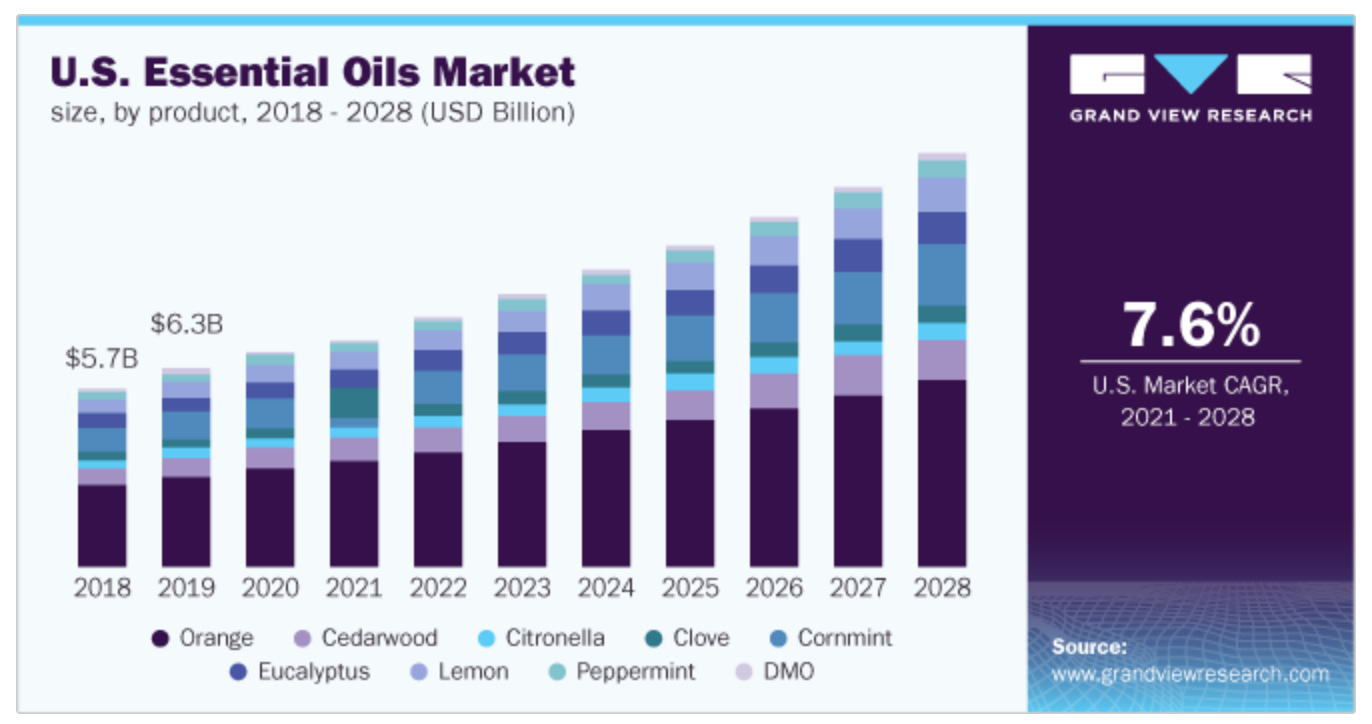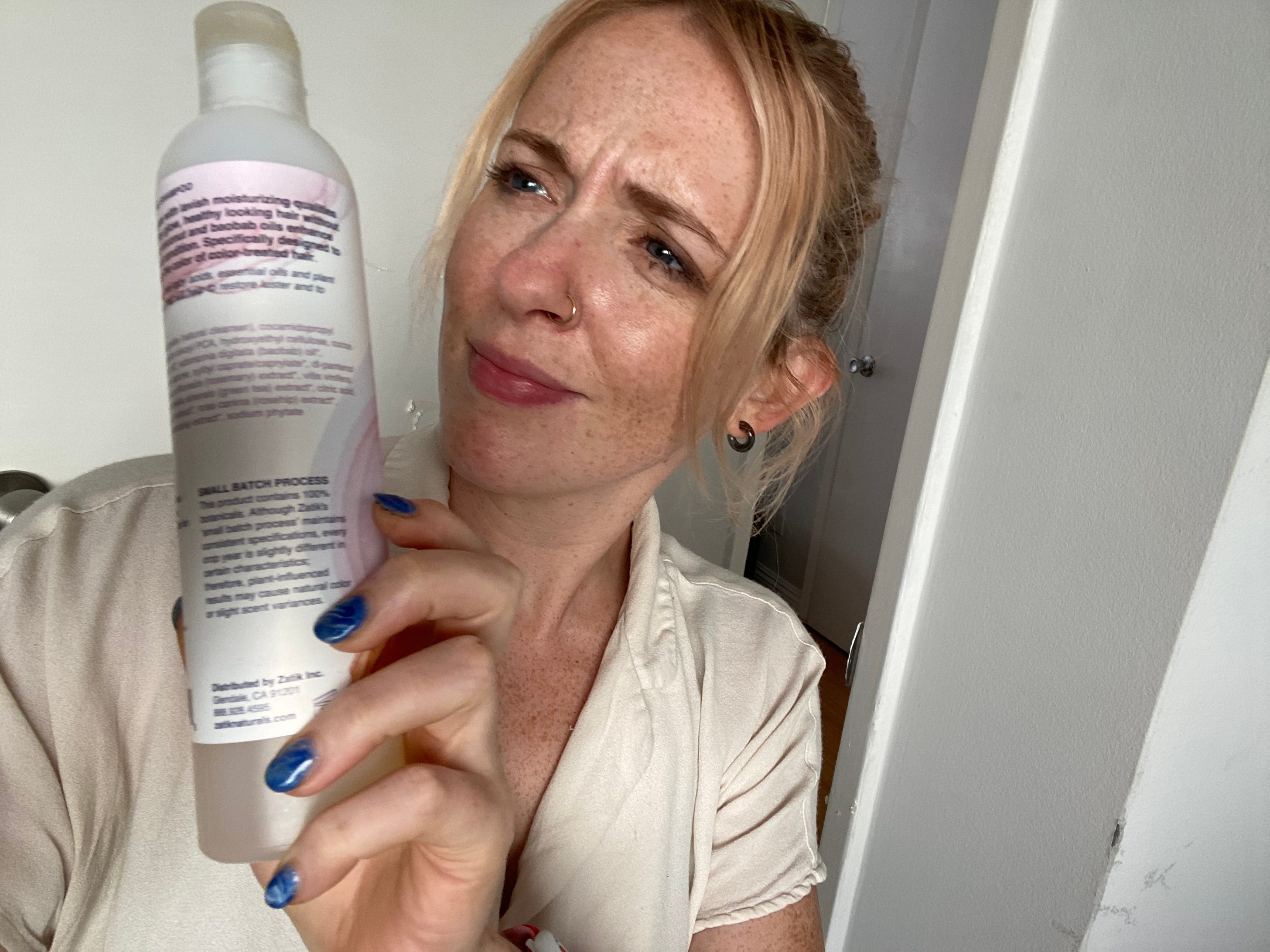HEATED - The dark side of essential oils
Welcome back to HEATED, a newsletter for people who are pissed off about the climate crisis—written by me, Emily Atkin. IN TODAY’S ISSUE…
Also, paid subscriptions are back! If you appreciate HEATED’s content and have the means to do so, consider becoming a paid subscriber. You’ll not only be supporting 100 percent independent climate journalism, you’ll be helping us hire a new reporter so we can increase our output as well as our impact. Hope you enjoy today’s investigation! The dark side of essential oilsThey have a reputation for being “pure and natural," but many essential oils are derived from fossil fuels—and there's almost no way to tell which ones.
I accidentally went into a research rabbit hole about essential oils last week. Today’s newsletter is an attempt to turn that hyperfixation into something useful. First, let me explain why it happened. You may remember I interviewed beauty industry reporter Jessica DeFino about the connections between Big Beauty and Big Oil last month. During that interview, we discussed common ingredients in beauty products that are derived from fossil fuels—things like petroleum jelly, mineral oil, sodium lauryl sulfate and isopropyl alcohol. But DeFino also noted that these were only the obvious fossil fuel-derived ingredients in beauty products. Many ingredients that come from fossil fuels appear to be completely natural. “For instance, some essential oils are extracted using hexane, which is a petrochemical,” she said. “So fossil fuels are involved in the process of creating some of these ‘natural’ products.” Our conversation moved on from there, but I didn’t. I wondered if all my carefully chosen natural products were deceiving. I looked at my “cruelty-free, 100% botanicals” shampoo containing essential oils, and only saw a bottle of lies. But I couldn’t be sure. After all, DeFino only said some essential oils are derived using petrochemicals. I needed to find out. Enter the rabbit hole. Two days, about a dozen chemistry-laden scientific journal articles, and a phone interview with an essential oils researcher in Australia later, I’ve learned a lot about how the fossil fuel industry benefits from our growing obsession with so-called “clean” products, which in many cases aren’t as clean as they appear. What are essential oils, and why do they matter?Essential oils, as defined by the journal Essential Oil Research, are “highly concentrated materials extracted from leaves, stems, flowers, seeds, roots, fruit rinds, resins, or barks.” They are used not only in beauty products and cosmetics, but in foods as “natural” flavor components; in household products for “natural” scents; and for “natural” homeopathic medicine. The reputation of essential oils tends to be rather granola. Natural beauty super-influencer Gwyneth Paltrow says her “daily secret to staying zen” is bathing in a tub filled with “all of the essential oils.” And the massive online skincare retailer DermStore markets its 1,188 essential oil products as being “associated with wellness, natural health, skin care and balance.” But just like granola, essential oils have been industrialized. In fact, they are “one of industry’s most successful commodities,” according to a 2022 review in the journal Plants. In 2020, the global essential oils market was valued at $18.6 billion, about the same as the global market for plastic bags. The essential oils market is also rapidly growing “due to the strong demand for pure natural ingredients in various fields,” according to a 2021 review in the journal Molecules. (This is certainly reflected on Amazon; its number one most-gifted beauty item is an essential oil shower bomb kit). But growing demand for essential oils doesn’t just increase demand for “pure natural ingredients.” It also increases demand for petrochemicals, which come from fossil fuels. Petrochemicals “are set to drive nearly half of oil demand growth by midcentury,” CNBC reported in January, adding that “every year through 2050, there will be 10 million metric tons of growth in the market for petrochemicals.” “Pure and natural” essential oils—or at least, what the industry calls essential oils—will contribute to that growth. How fossil fuels are used to extract essential oilsThere are many ways to turn a plant into an essential oil. There’s steam distillation, in which the plant’s volatile compounds are vaporized by steam before going through a condensation and collection process. There’s also hydro distillation, where the plant material is boiled in water, and microwave-assisted extraction, which is essentially hydro distillation with the assistance of microwave heating. These traditional ways of producing essential oils, however, can be expensive and painstaking. Thus, some in the essential oils industry have taken to using a process called solvent extraction. In this process, a petrochemical solvent dissolves the plant’s non-volatile components and is evaporated off, leaving the finished product. Hexane, a hazardous chemical solvent obtained during petroleum refining, is the most popular solvent used to extract essential oils. There are currently 534 facilities that produce or process hexane in the United States, according to the CDC. The major companies that produce it include Exxon, Merck and Shell. Hexane is also among the oil industry’s most promising petrochemicals. The $1.9 billion industry is expected to grow to $2.9 billion by 2021, according to Transparency Market Research—in part because of “Growing use of hexane as a specialty solvent in industrial applications.” Nicholas Sadgrove, a natural products chemist and pharmacologist who specializes in essential oils, said hexane use in the essential oil industry is likely growing. “There is incentive in the market to go down the path of [solvent] extraction,” he said, adding that the process allows companies to “capture more of the essential oil components.” It’s impossible to know, however, how much the essential oils industry is increasing petrochemical demand, because there are no regulations forcing companies to disclose how they produce their essential oils. In other words, if you want to ensure your essential oils are free from the petrochemical process, it’s going to cost you a lot of time and money. How to find out if your essential oil is full of liesBefore going any further, I should probably mention one small detail I learned from Sadgrove: If an essential oil is produced using a petrochemical solvent, it is not technically an essential oil. It is a product called an absolute, which is different. But companies are allowed to market absolutes as essential oils. They’re also allowed to market bottles of vegetable oil with fragrance as essential oils. “There’s huge variations to what people may be buying,” Sadgrove said. “Depending on where you got it, you might have a bottle full of rapeseed oil,” he said. (And rapeseed oil is generally made using—you guessed it—hexane). Sadgrove said there is only one sure-fire way to ensure your essential oils are not petrochemically-extracted lies: “You would have to recruit an authentication researcher, send a bottle to their lab, and have them find out for you.” Knowing that’s rather prohibitive, however, he said there are a few other options. You can avoid “essential oils” that come from delicate plants like rose, jasmine, and orange flower, as they are almost always extracted via petrochemical solvents. Or you can find a company that explicitly says they’re petrochemical free—though you’d have to trust they’re telling the truth. Still, Sadgrove warned, it’s not like finding a petrochemical-free essential oil makes you free and clear of environmental harm. Essential oils come from plant material, which may or may not be sustainably harvested. And traditional processes like steam and hydro distillation require lots of time heating up water, which requires a lot of energy, which most likely comes from fossil fuels. At the end of the day it comes down to personal value judgment. Which do you consider worse: energy use or petrochemicals? You can obsess over which is more harmful, or you can do what I eventually did: accept that green consumerism is still consumerism, and that consumerism is a massive driver of climate change. If you want to avoid harming the climate with your purchases, just purchase fewer things. Even better, demand stronger regulations to prevent greenwashing, particularly in the beauty industry. Lord knows they could use some. P.S. — MY SHAMPOO IS FULL OF LIES: Just for funsies, I asked Sadgrove if I could read him the ingredients in my all-natural shampoo that purports to be “formulated with essential oils,” to see if it was deceiving me. Though he couldn’t say whether they were extracted via petrochemicals, he said that based on the names of the ingredients, none of them appear to meet the scientific definition of essential oils. CATCH OF THE DAY: Fish is proud to introduce you to two more of his friends today Our next furry friend has an unknown location. But we do know her name: Dorje, and she lives with reader Murray. Want to see your furry (or non-furry!) friend in HEATED? Send a picture and some words to catchoftheday@heated.world. You’re a free subscriber to HEATED. For the full experience, become a paid subscriber. |
You Might Also Like
12 Charming Movies to Watch This Spring
Sunday, March 9, 2025
The sun is shining, the tank is clean – it's time to watch some movies ͏ ͏ ͏ ͏ ͏ ͏ ͏ ͏ ͏ ͏ ͏ ͏ ͏ ͏ ͏ ͏ ͏ ͏ ͏ ͏ ͏ ͏ ͏ ͏ ͏ ͏ ͏ ͏ ͏ ͏ ͏ ͏ ͏ ͏ ͏ ͏ ͏ ͏ ͏ ͏ ͏ ͏ ͏ ͏ ͏ ͏ ͏ ͏ ͏ ͏ ͏ ͏ ͏ ͏ ͏ ͏ ͏ ͏ ͏ ͏ ͏ ͏ ͏
10 Ways to Quiet Annoying Household Noises
Sunday, March 9, 2025
Digg Is Coming Back (Sort Of). Sometimes the that's noise bothering you is coming from inside the house. Not displaying correctly? View this newsletter online. TODAY'S FEATURED STORY 10 Ways to
The Weekly Wrap # 203
Sunday, March 9, 2025
03.09.2025 ͏ ͏ ͏ ͏ ͏ ͏ ͏ ͏ ͏ ͏ ͏ ͏ ͏ ͏ ͏ ͏ ͏ ͏ ͏ ͏ ͏ ͏ ͏ ͏ ͏ ͏ ͏ ͏ ͏ ͏ ͏ ͏ ͏ ͏ ͏ ͏ ͏ ͏ ͏ ͏ ͏ ͏ ͏ ͏ ͏ ͏ ͏ ͏ ͏ ͏ ͏ ͏ ͏ ͏ ͏ ͏ ͏ ͏ ͏ ͏ ͏ ͏ ͏ ͏ ͏ ͏ ͏ ͏ ͏ ͏ ͏ ͏ ͏ ͏ ͏ ͏ ͏ ͏ ͏ ͏ ͏ ͏ ͏ ͏ ͏ ͏ ͏ ͏ ͏ ͏ ͏ ͏ ͏ ͏ ͏
Weekend: Introducing the Butt Mullet Dress 👀
Sunday, March 9, 2025
— Check out what we Skimm'd for you today March 9, 2025 Subscribe Read in browser Header Image But first: Join the waitlist for a new premium Skimm experience Update location or View forecast
Starting Thursday: Rediscover Inspiration Through Wordsworth
Sunday, March 9, 2025
Last chance to register for our next literary seminar starting March 13. March Literary Seminar: Timothy Donnelly on William Wordsworth Rediscover one of the most influential poets of all time with
5 little treats for these strange and uncertain times
Sunday, March 9, 2025
Little treat culture? In this economy?
RI#266 - Down the rabbit hole/ What is "feels-like" temp/ Realtime voice tutor
Sunday, March 9, 2025
Hello again! My name is Alex and every week I share with you the 5 most useful links for self-improvement and productivity that I have found on the web. ---------------------------------------- You are
Chaos Theory: How Trump is Destroying the Economy
Sunday, March 9, 2025
Trump's erratic, chaotic governing style is dragging down the economy ͏ ͏ ͏ ͏ ͏ ͏ ͏ ͏ ͏ ͏ ͏ ͏ ͏ ͏ ͏ ͏ ͏ ͏ ͏ ͏ ͏ ͏ ͏ ͏ ͏ ͏ ͏ ͏ ͏ ͏ ͏ ͏ ͏ ͏ ͏ ͏ ͏ ͏ ͏ ͏ ͏ ͏ ͏ ͏ ͏ ͏ ͏ ͏ ͏ ͏ ͏ ͏ ͏ ͏ ͏ ͏ ͏ ͏ ͏ ͏ ͏ ͏ ͏ ͏
Chicken Shed Chronicles.
Sunday, March 9, 2025
Inspiration For You. ͏ ͏ ͏ ͏ ͏ ͏ ͏ ͏ ͏ ͏ ͏ ͏ ͏ ͏ ͏ ͏ ͏ ͏ ͏ ͏ ͏ ͏ ͏ ͏ ͏ ͏ ͏ ͏ ͏ ͏ ͏ ͏ ͏ ͏ ͏ ͏ ͏ ͏ ͏ ͏ ͏ ͏ ͏ ͏ ͏ ͏ ͏ ͏ ͏ ͏ ͏ ͏ ͏ ͏ ͏ ͏ ͏ ͏ ͏ ͏ ͏ ͏ ͏ ͏ ͏ ͏ ͏ ͏ ͏ ͏ ͏ ͏ ͏ ͏ ͏ ͏ ͏ ͏ ͏ ͏ ͏ ͏ ͏ ͏ ͏ ͏ ͏ ͏ ͏ ͏
“Hymn of Nature” by Felicia Dorothea Hemans
Sunday, March 9, 2025
O! Blest art thou whose steps may rove ͏ ͏ ͏ ͏ ͏ ͏ ͏ ͏ ͏ ͏ ͏ ͏ ͏ ͏ ͏ ͏ ͏ ͏ ͏ ͏ ͏ ͏ ͏ ͏ ͏ ͏ ͏ ͏ ͏ ͏ ͏ ͏ ͏ ͏ ͏ ͏ ͏ ͏ ͏ ͏ ͏





